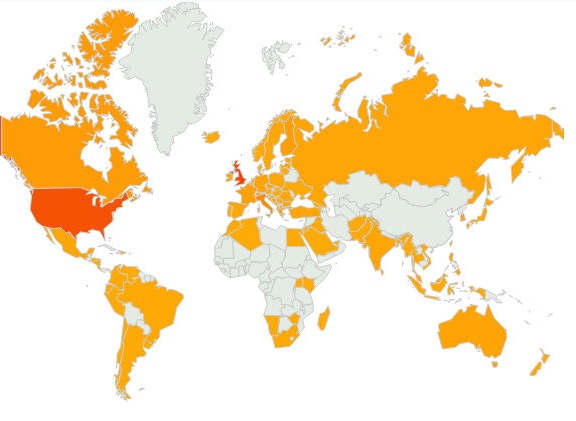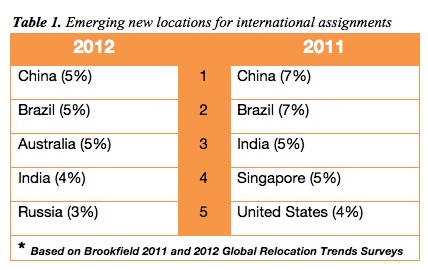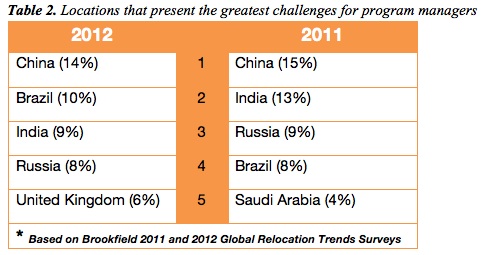 Recently, Brookfield Global Relocation Services released their 17th Global Relocation Trends Survey report, which gives a comprehensive overview of current trends, challenges and solutions in the world of global mobility. Generally speaking, compared to last year’s report there are no big differences, which implies a relative stability of relocation trends.
Recently, Brookfield Global Relocation Services released their 17th Global Relocation Trends Survey report, which gives a comprehensive overview of current trends, challenges and solutions in the world of global mobility. Generally speaking, compared to last year’s report there are no big differences, which implies a relative stability of relocation trends.
The list of top five expatriate destinations follows the patterns of last year and looks like the following: United States (1st), China (2nd), United Kingdom (3rd), Singapore (4th) and Germany (5th). The stability of the top destinations is quite apparent, given that the US, China and the UK have been present among the top three destinations since the 2000 report data. The 2012 Cartus Global Mobility Policy and Practices Survey indicates a fairly similar list of top destinations, although their data shows that Singapore has replaced the UK on the third place, and that Switzerland got a place in the top 5 ranking. The emergence of Switzerland is echoed also in the Brookfield data, as compared to 2011 Switzerland moved from 18th to 7th position.
As for emerging new destinations for companies, the stats suggest that the BRIC countries (Brazil, Russia, India and China) are still in the focus. Compared to 2011, the Brookfield report shows that Australia and Russia entered the top five countries by replacing Singapore and the United States (see Table 1). However, Singapore and the US still remain important new entry locations for firms, as in 2012 they are ranked 8th and 9th respectively.
This year’s respondents also indicated several countries that did not appear in the top 20 ranking of new destinations in the 2011 report: namely, Colombia, Angola, Czech Republic, Indonesia, South Korea, Malaysia, Montenegro, Turkey and Vietnam. The continuous emergence of new destinations is in line with the notion that the international assignee population continues to grow, as 64% of the Brookfield survey respondents reported an increase in the number of expatriates over the last year.
Looking at the challenging destinations, the Brookfield report differentiates between assignees’ and program managers’ standpoints. The top five challenging countries for assignees consist of the BRIC countries and the US in the following order: China (1st), Brazil (2nd), India (3rd), Russia (4th), and the US (5th). Although the same countries constituted the top 5 in 2011, the order was slightly different, with Brazil moving two rankings upward for the current year’s data. Moreover, different from the 2011 report, Australia, Colombia, Kazakhstan, Libya and Singapore were the newcomers to appear in the top 20 destinations that present the greatest challenges for international assignees in 2012. Interestingly, along with emerging markets and remote countries, the US, being a developed and an expatriation ‘veteran’ country, still presents noticeable assignment difficulties. The verbatim commentaries of participants suggest that these difficulties mainly lie within compliance with legislation that presents several regulatory barriers. For example, one of the participants brought up that the US is ‘extremely strict for unmarried couples which proves problematic for dual career assignees’.
Similar to assignees, program managers perceive the BRIC countries to be the most challenging. Contrary to expatriates, however, relocation professionals see bigger challenges in the UK (in 2012) than in the US (see table 2).
The perception of higher challenges in the UK by relocation managers can be possibly explained by the changes of immigration laws that took place in April 2011, and which included a permanent immigration cap on skilled immigration, as well as new criteria for skilled workers with a job offer and intra-company transfers. Given that compliance with governmental immigration laws is the responsibility of the employer, it is quite natural that such changes were left unnoticed by the expatriates themselves. Overall, the verbatim commentaries of survey participants concerning their perceived challenges indicate a wide range of issues associated with relocation, such as host country legal requirements, compliance with regulations, culture and language differences, housing arrangements, as well as political situation and civil unrest.




How about South America?
Hi,
It was an very interesting article, could you make an update of the 2 tables with the 2013 data survey? Than you 🙂